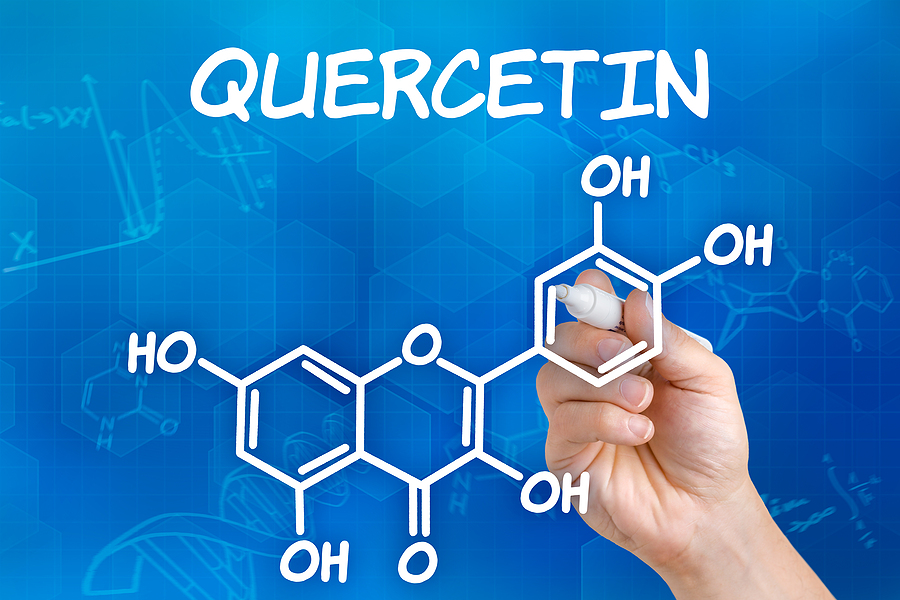Today we’re going to talk about the health benefits of quercetin, which is a plant flavoniod that helps to address multiple health issues.
Quercetin is found in a wide range of foods such as grape skins, red onions, green tea, and tomatoes. And while this ingredient is naturally abundant in plant foods, most people do not get enough quercetin through their daily diets.
Part of the reason why is that the American diet is centered on high protein from animal sources. Or high in carbohydrates from processed grains, which strips out needed nutrients.
This is unfortunate because the research clearly shows the health benefits of quercitin on a wide range of concerns.
Cardiovascular Disease
The number one killer of all people is cardiovascular disease. Quercetin can be a significant help in this area. In a study of 805 men that ranged in age from 65-84 years old, those with the highest intake of quercetin were 68% less likely to die from coronary heart disease when compared to those with the lowest intake.
Other studies in this areas showed a reduction in death rates of 31% for women and 24% for men, when all causes were factored. And scientists attribute this reduction to several key factors, which include the following:
-
Reduction of dangerous accumulations of abdominal and liver fat.
-
Reduction in total cholesterol.
-
Reduction in LDL (Bad) cholesterol.
-
Increase in HDL (Good) cholesterol.
-
Reduction in blood sugar.
-
Reduction in blood pressure.
-
Increased plasma levels of nitric oxide.
-
Inhibits platelet aggregation to reduce potential for blood clots.
-
Inhibits the oxidation of LDL cholesterol.
This last benefit of inhibiting the oxidation of LDL cholesterol is significant because oxidized LDL cholesterol causes vascular inflammation that leads to plaque formation and the disease know as atherosclerosis.
In one human study, those who supplemented with just 30 mg/day of quercetin had a 28% reduction in LDL oxidation in as little as two weeks.
Cancer
The second leading cause of death in the United States is cancer. This is another area that the health benefits of quercetin show up. Numerous research studies have shown those with the highest intake of quercetin had a significantly lower risk for most of the leading causes of cancer. For example:
-
Lung cancer – a 51% overall risk reduction and for smokers a 65% reduction.
-
Colon cancer – 32% reduction in risk.
-
Gastric (stomach) cancer – 43% risk reduction and for female smokers a 80% risk reduction.
Plus, there is emerging research data showing that quercetin may play a role in reducing the risk for breast, prostate, and liver cancers.
Immune System
Quercetin also plays a role in the immune system. Especially in helping it not to overreact to allergins. Allergins cause an allergic response with irritating symptoms like a runny nose and waterly eyes, to more life-threatening responses.
Quercetin helps to suppress the action of the immune system in several ways:
-
Reducing the amount of histamine.
-
Inhibiting inflammatory cytokine release.
-
Blocks intestinal inflammation from allergy-related antibodies.
-
Blocks the allergy-like components of an asthma response.
And for those with COPD (chronic obstructive pulmonary disease), quercetin works on multiple levels. It helps to restore normal lung tissue elasticity, reduces inflammation, and reduces the production of a protein-melting enzyme that dissolves alveolar walls.
This means that quercetin can help to maintain the lungs’ normal architecture and function.
While quercetin helps your immune system from overreacting, it also helps your immune system to more vigorously respond to viruses and bacteria. In laboratory studies quercetin was more effective in inhibiting influenze A virus than the anti-flu drug Tamiflu.
And quercetin helps to block the replication of the rhinovirus that is responsible for the common cold.
As your can see, there are multiple health benefits of quercetin. Which means if your diet is lacking in plant based nutrition, then you should consider supplementing with this key nutrient.
Blessing Lives Through Nitric Oxide Therapy!
Dan Hammer

Leave a Reply
You must be logged in to post a comment.